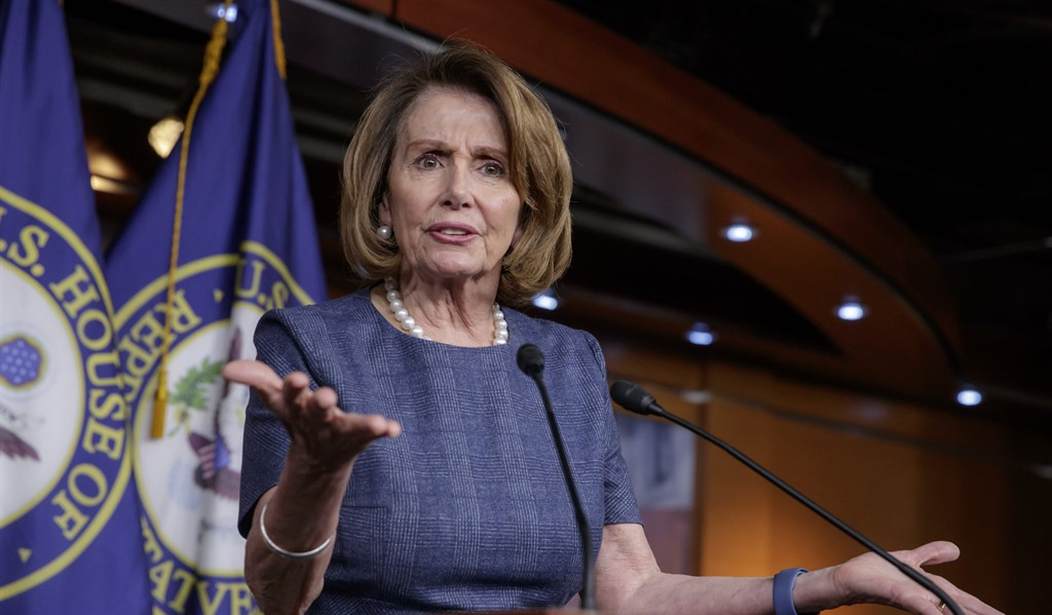Suppose the federal government confiscated 90 percent of the income of every private sector worker who earned more than the poverty level.
Then suppose the government used some of that confiscated money to pay government workers and the rest to provide benefits to people who do not work or earn less than the poverty level.
Would that be a transfer of wealth?
If so, would that transfer of wealth go from those whose money the government confiscated to those who received it? Or from those who received it to those forced to give it up?
How would House Minority Leader Nancy Pelosi answer that question?
This scenario, of course, is a reductio ad absurdum. But Pelosi's argument against the Republican's flawed plan to replace Obamacare is also absurd.
She essentially argues that any diminution in the amount of money the government takes from Tom to give to Harry is in fact a transfer of wealth from Harry to Tom.
The Pelosi Principle is this: If the government lets you keep your property, it is depriving someone else of it.
"The Republican bill is one of the largest transfers of wealth from working families to the richest people in our country -- Robin Hood in reverse," Pelosi said at her press briefing last Thursday.
On Monday, after CBO released its analysis of the plan, she repeated: "They are implementing the biggest transfer of wealth in our history."
"How can they look their constituents in the eye," Pelosi said, "when they say to them, 24 million of you are no longer to have coverage."
CBO outlined who it believes those 24 million will be.
Most of the first large bloc, said CBO, would not be people the government forces out of insurance but people it can no longer force in.
Recommended
In 2018, said CBO, "14 million more people would be uninsured under the legislation than under current law.
"Most of that increase would stem from repealing the penalties associated with the individual mandate," it said. "Some of those people would choose not to have insurance because they chose to be covered by insurance under current law only to avoid paying the penalties, and some people would forgo insurance in response to higher premiums."
But, CBO concluded, once the Republican plan was in effect a couple of years, premiums would be lower than under Obamacare -- not higher.
"By 2026," it says, "average premiums for single policyholders in the nongroup market under the legislation would be roughly 10 percent lower than under the current law."
Thus, by eliminating the individual mandate and lowering premiums, the Republican plan would prevent at least this version of what would otherwise be a government-mandated transfer of wealth from individuals to insurance companies.
Additionally, the Republican plan would lessen -- not increase -- the burden Obamacare places on younger people (who tend to make less money) to subsidize the insurance of older people (who tend to make more).
"Under the legislation," says CBO, "insurers would be allowed to generally charge five times more for older enrollees than younger ones rather than three times more as under current law, substantially reducing the premiums for young adults and substantially raising the premiums for older people."
The second large bloc to become "uninsured" under the Republican plan, according to CBO, would be people who -- if Obamacare continued -- would go on welfare in the form of Medicaid.
"The reductions in insurance coverage between 2018 and 2026 would stem in large part from changes in Medicaid enrollment," says CBO, "because some states would discontinue their expansion of eligibility, some states that would have expanded eligibility in the future would choose not to do so, and per-enrollee spending in the program would be capped."
Under Obamacare, the government takes wealth from people who earn more than the Medicaid-eligible income and transfers it to those who earn less. The Republican plan would diminish that transfer of wealth by diminishing the anticipated number of people on Medicaid.
Unfortunately, the Republican plan does not totally reject the Pelosi Principle.
It replaces Obamacare's insurance-buying subsidy for anyone making less than 400 percent of poverty with a "refundable tax credit" -- n.b. a subsidy -- determined by a person's age and income.
It replaces Obamacare's mandate that individuals buy health insurance or face a tax penalty with a mandate that insurers impose premiums 30 percent higher for a full year on anyone who fails to buy insurance for 63 days.
Both Republicans and Democrats have rejected the principle of subsidiarity that once governed American health care: Individuals who could not pay for their own care were covered by private, particularly religious, charities and local governments.
Now, whichever plan we get, will have at its core a massive and impersonal central government that takes wealth from one set of people, gives it to another, and uses the leverage gained from that compulsory exchange to control a key part of our lives.

























Join the conversation as a VIP Member